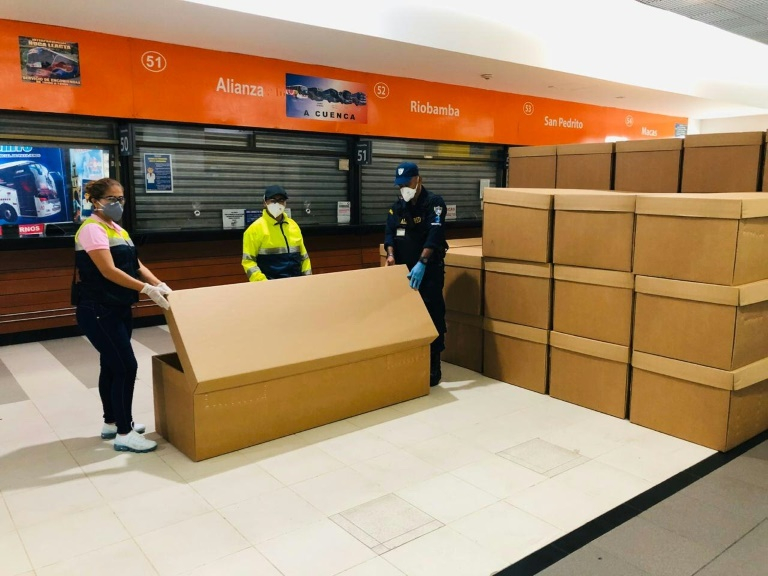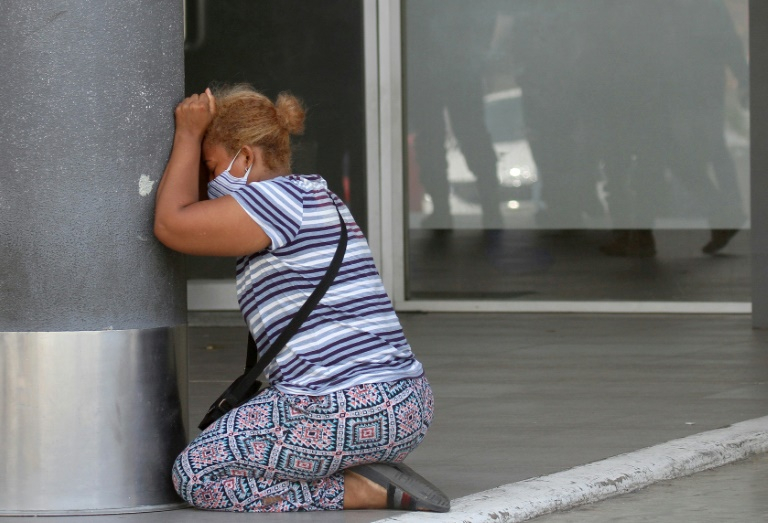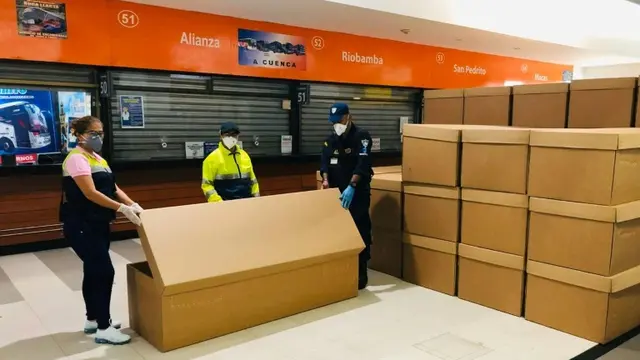
Cardboard coffins in Guayaquil mayor's office, in Ecuador, April 6, 2020 /AFP
Ecuador has confirmed 318 deaths from the coronavirus, one of the highest tallies in Latin America. Soaring numbers of COVID-19 deaths in Ecuador's second largest city Guayaquil have led to a shortage of coffins, forcing locals to resort to using cardboard boxes, city authorities said Sunday.
But President Lenin Moreno said this week that the real figure was higher as authorities were collecting more than 100 bodies a day, many from relatives' homes as a strict quarantine prevented them from being buried.
Moreno said the government expected the total number of deaths in Guayaquil's surrounding province to reach up to 3,500, and said a "special camp" was being built to bury the dead.
Guayaquil authorities said they had received a donation of 1,000 pressed cardboard caskets from local producers, and delivered them for use in two local cemeteries.
"It's so they can meet demand," a city hall spokesman told AFP. "There are either no coffins in the city or they are extremely expensive." The cheapest coffins currently cost around 400 U.S. dollars.
Businessman Santiago Olivares, who owns a chain of funeral homes, said his company was unable to keep up with demand.
"I sold the 40 that I had at the downtown branch, and 40 others from my headquarters. I had to order 10 more at the weekend and they've run out," Olivares told AFP.
Olivares said a 15-hour curfew in the city was contributing to the shortage of basic raw materials for coffin makers like wood and metal.
Last week, residents posted videos on social media showing abandoned bodies in the streets in the Latin American city worst hit by the pandemic.
The government called in troops to pick up 150 corpses from streets and homes earlier this week after mortuary workers in the city were unable to keep up with a backlog of removals.
The cardboard coffins "will be a great help in providing a dignified burial for people who died during this health emergency," the Guayaquil mayor's office wrote on Twitter.
The hospital on Sunday confirmed that it had set up a refrigerated container to hold the bodies of those who died amid the pandemic, adding that the arrangement was being operated in accordance with World Health Organization protocols.
On Saturday, Ecuador's government said it would activate a new digital system that would allow families to find out where their dead relatives were buried.

A woman cries after learning of the death of a relative at Los Ceibos Hospital in Guayaquil, Ecuador, April 6, 2020. /AFP
Meanwhile, in another hard-hit region in Americas, the U.S. state of New York, 600 people are now dying each day, which equals a 9/11 death toll every five days. More than 4,000 have already died and it is projected that at least 16,000 New Yorkers will lose their lives in the weeks ahead.
The city's funeral homes are struggling to collect them. There is just too big a backlog. Families have to wait up to a week before a crematorium can hold a service. They're all booked solid.
Families are suggested by the funeral homes to place the bodies in a cardboard box rather than a wooden coffin, so their corpses can burn faster, allowing more services to be provided every day.
Last week, Paris police announced to convert Europe's largest food market to store coffins holding the bodies of people who have died from the coronavirus, as France's morticians struggle to keep up with the mounting death toll.
AFP reported that Paris Police Chief Didier Lallement said the move was necessary to relive undertakers in Paris from the immense pressure they currently face. Over 4,000 people have died from coronavirus in France.
The refrigerated hall of the wholesale food market Rungis, located in a southern suburb of Paris of the same name, has been taken over by city authorities to be used for this purpose, Paris police announced on Thursday. Rungis is the main food market in Paris and the largest wholesale market in Europe.
The first coffins containing human remains will begin arriving at the hall on Friday. The building will accommodate between 800 and 1,000 coffins.
(With input from agencies)
 简体中文
简体中文










